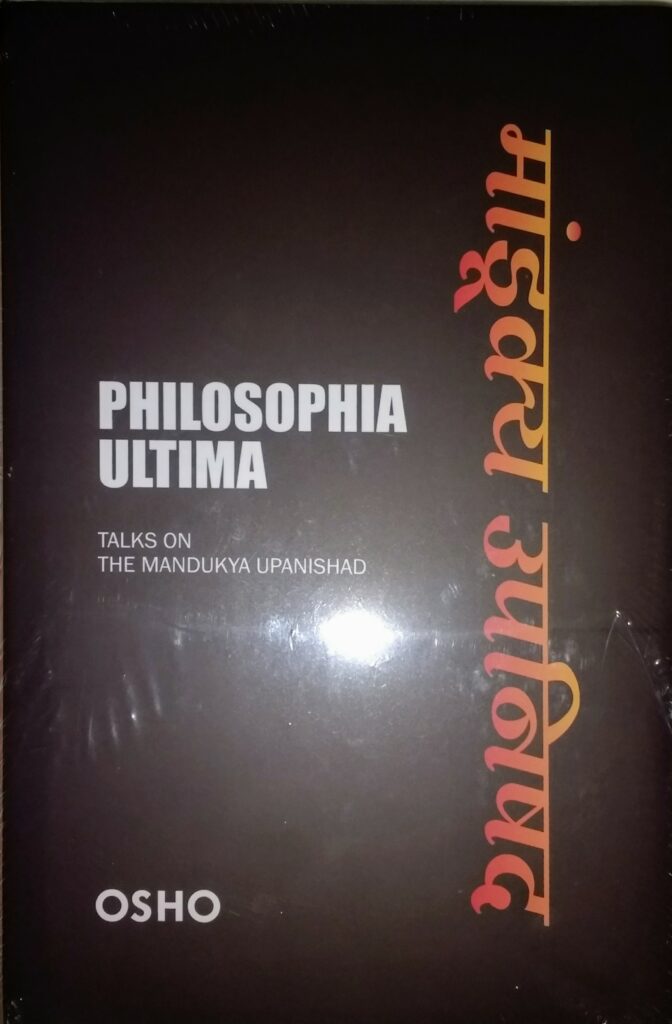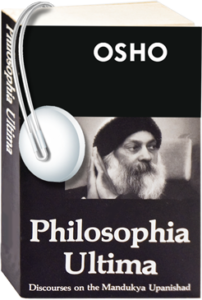
Talks on the Mandukya Upanishad
There is no way to beyond the Mandukya Upanishad, its message is eternal and represents the ultimate in human consciousness. While science dissects and divides, the Upanishad is a holistic, individual approach; a unifying vision. “That’s the message of the Upanishadic philosophy, of the Mandukya Upanishad: wholeness,” says Osho as he uses its twelve verses, and one from the Ishavasya Upanishad, to illuminate the meaning of “om” and show the four stages on the path of enlightenment. Exploring each verse with deep understanding, using humor and jokes rather than academic commentary, and responding to questions on many aspects of modern life, Osho encourages the reader to an awakening based on their own experience.
The Universe is an undivisible Totality
These talks contain what Osho describes as the most significant statements ever made, and which point to the whole secret of the mystic approach towards life. And the sutra that begins this series of discourses, he says, contains the very essence of the entire Upanishadic vision – that the universe is an indivisible totality, an organic whole. Osho illuminates these ancient texts with such clarity that their significance seems stunningly obvious. A wealth of jokes and amusing anecdotes are magically interwoven through his commentaries.
Philosophia Ultima weerspiegelt de wijsheid van de Mandukuya Upanishad
Er is geen manier om verder te gaan dan de Mandukya Upanishad, de boodschap is eeuwig en vertegenwoordigt het ultieme in menselijk bewustzijn. Terwijl de wetenschap ontleedt en verdeelt, is de Upanishad een holistische, individuele benadering; een verbindende visie. ‘Dat is de boodschap van de Upanishadische filosofie, van de Mandukya Upanishad: heelheid’, zegt Osho terwijl hij de twaalf verzen en een van de Ishavasya Upanishad gebruikt om de betekenis van ‘om’ te belichten en de vier stadia op het pad van verlichting. Osho verkent elk vers met diep begrip, gebruikt humor en grappen in plaats van academisch commentaar, en beantwoordt vragen over vele aspecten van het moderne leven, en moedigt de lezer aan tot een ontwaken op basis van hun eigen ervaring.
Onderlinge Verbondenheid
‘De Upanishadische visie is dat het universum een totaliteit is, ondeelbaar; het is een organisch geheel. De delen zijn niet gescheiden, we bestaan allemaal in een groot samenzijn: de bomen, de bergen, de mensen, de vogels, de sterren, hoe ver ze ook mogen lijken – laat je niet misleiden door de buitenkant – ze zijn allemaal met elkaar verbonden, staan allemaal in contact met elkaar. Zelfs het kleinste grassprietje is verbonden met de verste ster en het is net zo belangrijk als de grootste zon.’ Osho
Existence precedes Essence
In Philosophia Ultima geeft Osho aan welke dwaling filosofen eeuwenlang te prooi zijn gevallen. En de mensen die d oor deze denkwijze beïnvloed werden, hebben hier ongelofelijk onder geleden. Speciaal in het Oosten kun je de schrijnende gevolgen hiervan zien. Men ging er, aldus Osho, ten onrechte vanuit dat “essence precedes existence”, de essentie gaat vooraf aan het bestaan, het programma gaat vooraf aan het leven zelf. Dit impliceert dat alles bij de mens vanaf de geboorte vastligt. Er is geen enkele, laat staan een radicale, verandering meer mogelijk. Terwijl: dit onderscheidt de mens juist van de dieren, dat hij niet onderhevig is aan een programma. Een hond of een roos blijft gedurende het hele bestaan hetzelfde.
oor deze denkwijze beïnvloed werden, hebben hier ongelofelijk onder geleden. Speciaal in het Oosten kun je de schrijnende gevolgen hiervan zien. Men ging er, aldus Osho, ten onrechte vanuit dat “essence precedes existence”, de essentie gaat vooraf aan het bestaan, het programma gaat vooraf aan het leven zelf. Dit impliceert dat alles bij de mens vanaf de geboorte vastligt. Er is geen enkele, laat staan een radicale, verandering meer mogelijk. Terwijl: dit onderscheidt de mens juist van de dieren, dat hij niet onderhevig is aan een programma. Een hond of een roos blijft gedurende het hele bestaan hetzelfde.
VERSCHIL MENS EN DIER
Er is geen sprake van een nieuwe keuze maken of een andere weg inslaan. Het programma ligt vanaf het ontstaan vast.
In het Oosten zien we op basis van deze misvattingen dat alles bij het oude blijft. Armoede, slavernij, slechte situaties waarin mensen verkeren, ze worden alle voor onveranderlijk aangenomen. “Het is nu eenmaal zo”. Vervolgens wendt men zijn blik af.
Maar dit is de ultieme vrijheid van de mens, zo geeft Osho aan, dat hij bewustzijn heeft en dat dit oneindig kan groeien. Hieruit blijkt dat het ‘Bestaan aan de Essentie’ vooraf gaat. het is dringend nodig dat het omgekeerde standpunt wordt herzien.
Er is recent een nieuwe uitgave van Philosophia Ultima die in India verkrijgbaar is. Verder is het schaars verkrijgbaar, mogelijk 2e hands bij de boekhandel. Het is verder als audiobook te bestellen.
Philosophia Ultima
These discourses contain what Osho describes as the most significant statements ever made, which point to the whole secret of the mystic approach toward life. And the sutra that begins this series of  discourses, he says, contains the very essence of the entire Upanishadic vision – that the universe is an indivisible totality, an organic whole. Osho illuminates these ancient texts with such clarity that their significance seems stunningly obvious. A wealth of jokes and amusing anecdotes are magically interwoven through his commentaries.
discourses, he says, contains the very essence of the entire Upanishadic vision – that the universe is an indivisible totality, an organic whole. Osho illuminates these ancient texts with such clarity that their significance seems stunningly obvious. A wealth of jokes and amusing anecdotes are magically interwoven through his commentaries.
Excerpt from: Philosophia Ultima, Chapter 1
“The Upanishadic vision is that the universe is a totality, indivisible; it is an organic whole. The parts are not separate, we are all existing in a togetherness: the trees, the mountains, the people, the birds, the stars, howsoever far away they may appear – don’t be deceived by the appearance – they are all interlinked, all bridged. Even the smallest blade of grass is connected to the farthest star, and it is as significant as the greatest sun.
THERE IS NO HIERARCHY IN EXISTENCE
“Nothing is insignificant, nothing is smaller than anything else. The part represents the whole just as the seed contains the whole. The seed contains the past – because all the trees that may happen through it are potentially there. And of course the seed contains the present. The seed looks so small, but it is not as small as it looks. If you dissect it you will not find the flowers and the colors and the fragrance, and then you may decide that the seed is empty, but in fact your method was wrong. “That’s what science has been doing with reality – dissecting it, analyzing it. Analysis is destructive. What is needed is a unifying vision, a synthesis. And that is the Upanishadic approach: the part becomes the whole, the whole becomes the part. There is no hierarchy in the Upanishadic vision of life. Nothing is lower, nothing is higher, nothing is mundane and nothing is sacred – all is one.
ONLY A FEW MYSTICS…
“This vision remained the vision of a few mystics. It never became part of human consciousness. that’s why there is so much misery in the world, so much ugliness, insensitivity. People are not flowering; their hidden splendor, their imprisoned splendor is not freed. People are living imprisoned lives, chained. They contain infinity in them but they are not even aware of it.” Osho